
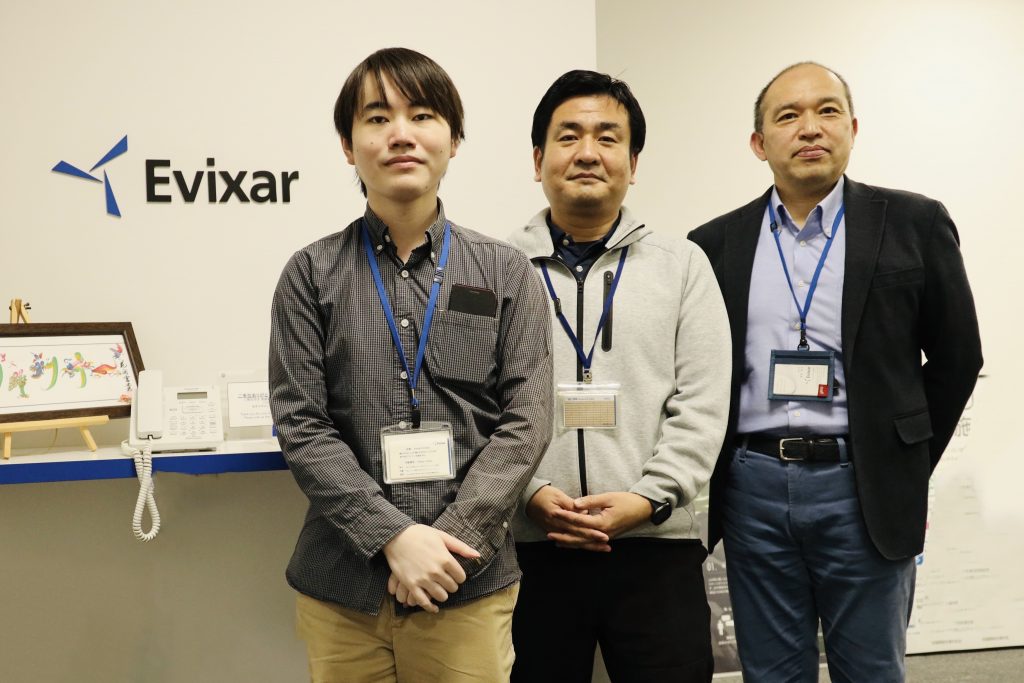
Hello, this is Naha Uematsu, a management member of Spotlite
In early december, We published an article reporting on movie outings by using HELLO! MOVIE the movie audio description application.
This time, we interviewed members of Evixar corporation, developed “HELLO! MOVIE” and spreads the capability of sound.
Check the previous article to see how to use “HELLO! MOVIE” and the process of using it.
In early december, We published an article reporting on movie outings by using HELLO! MOVIE the movie audio description application.
This time, we interviewed members of Evixar corporation, developed “HELLO! MOVIE” and spreads the capability of sound.
Check the previous article to see how to use “HELLO! MOVIE” and the process of using it.
People who we interviewed were, from left to the right
General manager, research and development department, business headquarter Kazunori Tokunaga Research and development department, business headquarter, Fuga Sakamoto General manager, sales department Takeshi Nasu
Of these three (omitted honorifics title)
From here, we will deep dive into the society that Evixar sets as a goal and also how “HELLO! MOVIE” was created. There were many hints in the process of creating new service and gently delivering to the society.
General manager, research and development department, business headquarter Kazunori Tokunaga Research and development department, business headquarter, Fuga Sakamoto General manager, sales department Takeshi Nasu
Of these three (omitted honorifics title)
From here, we will deep dive into the society that Evixar sets as a goal and also how “HELLO! MOVIE” was created. There were many hints in the process of creating new service and gently delivering to the society.
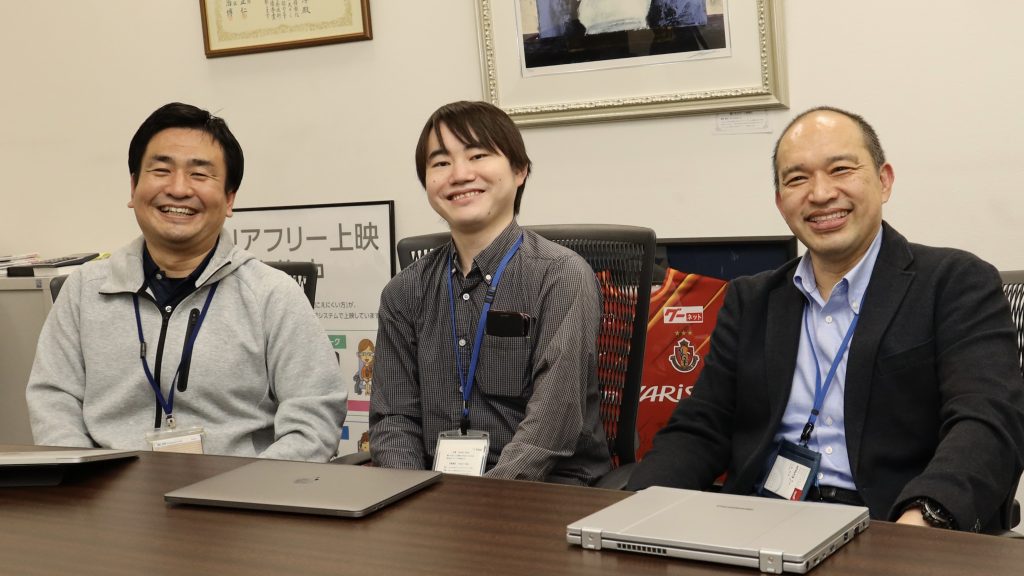
Photo: them at the Evixar’s office, (taken by Spotlite)

Interview
 Acoustic communication technology that increased the fear of Sadako
Acoustic communication technology that increased the fear of Sadako
― Can you please tell us how “HELLO! MOVIE” was started?
【Tokunaga】 We released “HELLO! MOVIE” application on february 10th, 2020. As an answer to how it started, I’d like to talk about the story of provision of our technology first, after we had an offer by a manager of a movie company saying, “we want to think of a totally new way of enjoying movies for the future, I think we can use your acoustic telecommunication technology, can’t we?”.
【Tokunaga】 Specifically, It was a service called “smartphone 4D”, which continuously attacked people with various curses linked to the story while watching a movie called “Sadako 3D 2” by activating a smartphone app. It has become an unprecedented style of watching movies that changed the common sense of the movie. there was an concept that smartphone was getting cursed, we got purified at the shrine(lol)
【Sakamoto】 Since that was before I got hired to the company, I didn’t actually participate in producing it, but the advertising video of “smartphone 4D” looked terrifying. It lights up as it links to the movie, it sends messages, and it displays some scary images on the phone in 3D.
【Tokunaga】 In the first place, you’re probably thinking “How do movies synchronize with smartphones? What does acoustic telecommunication technology mean?” right? Well, we receive sounds that the speaker in the movie theatre produces on a device which has a microphone like a smartphone. And then, devices react with information that has been embedded into each sound. That’s how this system works. We catch this technology as “making sound have different meanings”. Synchronizing speed is also the characteristic of this, it can quickly deliver the real time audio description because it can receive information within 0.1 second.
【Tokunaga】 This effort of “Sadako 3D 2” was introduced in the media as a new method of watching movies. It gained huge reactions from surroundings, we were also able to win awards for creative relations. From the movie industry's perspective, they had concerns about getting eavesdropped due to using phones during the movie. However it had a high reputation as a new style of watching movies, which became the reason to get many inquiries from not just movie related companies but also others. Other than movies, we’ve been creating various algorithm by Developing technology that suits the environment like TV broadcasting and commercial facilities.
【Tokunaga】 We released “HELLO! MOVIE” application on february 10th, 2020. As an answer to how it started, I’d like to talk about the story of provision of our technology first, after we had an offer by a manager of a movie company saying, “we want to think of a totally new way of enjoying movies for the future, I think we can use your acoustic telecommunication technology, can’t we?”.
【Tokunaga】 Specifically, It was a service called “smartphone 4D”, which continuously attacked people with various curses linked to the story while watching a movie called “Sadako 3D 2” by activating a smartphone app. It has become an unprecedented style of watching movies that changed the common sense of the movie. there was an concept that smartphone was getting cursed, we got purified at the shrine(lol)
【Sakamoto】 Since that was before I got hired to the company, I didn’t actually participate in producing it, but the advertising video of “smartphone 4D” looked terrifying. It lights up as it links to the movie, it sends messages, and it displays some scary images on the phone in 3D.
【Tokunaga】 In the first place, you’re probably thinking “How do movies synchronize with smartphones? What does acoustic telecommunication technology mean?” right? Well, we receive sounds that the speaker in the movie theatre produces on a device which has a microphone like a smartphone. And then, devices react with information that has been embedded into each sound. That’s how this system works. We catch this technology as “making sound have different meanings”. Synchronizing speed is also the characteristic of this, it can quickly deliver the real time audio description because it can receive information within 0.1 second.
【Tokunaga】 This effort of “Sadako 3D 2” was introduced in the media as a new method of watching movies. It gained huge reactions from surroundings, we were also able to win awards for creative relations. From the movie industry's perspective, they had concerns about getting eavesdropped due to using phones during the movie. However it had a high reputation as a new style of watching movies, which became the reason to get many inquiries from not just movie related companies but also others. Other than movies, we’ve been creating various algorithm by Developing technology that suits the environment like TV broadcasting and commercial facilities.
 Image of smartphone screen, with official app“smartphone 4D” of movie “Sadako 3D2” opened (by Evixar corporation)
Image of smartphone screen, with official app“smartphone 4D” of movie “Sadako 3D2” opened (by Evixar corporation)
― How did it lead to the development of “HELLO! MOVIE” app?
【Tokunaga】 “Sadako 3D 2” was captured in the event that took place at The National Museum of Emerging Science and Innovation. Hisaharu Suzuki, pioneer of technology development of our company (current Director of Executive officer, COO and CTO) stood there and talked about how it started and stuff. In the audience at that time, there was Koji Kawano, the director of Media Access Support Center (shortly MASC) who was going to be a key person in the development of “HELLO! MOVIE”. I think Mr.Nasu contacts him twice a week, at least you see him once a week don’t you Mr.Nasu?
【Nasu】 Yes, I was actually with him right before this interview(lol). Mr.Kawano was originally a technician involved in the video. After receiving requests from handicapped people about barrier-free access to movies, he decided to start the current NPO to promote the use of audio guides and subtitle guides, hoping that people with visual and hearing disabilities could also enjoy movies and share the excitement with others. At the time, because they had to utilize overseas technology to provide barrier free screening, it was difficult to grasp the situation for communication and price. So he was attracted to our technology and gave us an offer. After then, By having Mr. Kawano acts as a go-between. We have come to have contact with people with disabilities.
【Tokunaga】 through various experiments, we were able to solve the problem of network wages not reaching the theatre, which had been issues in the past, as well as the problem of synchronization. We valued persistence in determination to solve problems, and didn’t give up until the end.
【Tokunaga】 “Sadako 3D 2” was captured in the event that took place at The National Museum of Emerging Science and Innovation. Hisaharu Suzuki, pioneer of technology development of our company (current Director of Executive officer, COO and CTO) stood there and talked about how it started and stuff. In the audience at that time, there was Koji Kawano, the director of Media Access Support Center (shortly MASC) who was going to be a key person in the development of “HELLO! MOVIE”. I think Mr.Nasu contacts him twice a week, at least you see him once a week don’t you Mr.Nasu?
【Nasu】 Yes, I was actually with him right before this interview(lol). Mr.Kawano was originally a technician involved in the video. After receiving requests from handicapped people about barrier-free access to movies, he decided to start the current NPO to promote the use of audio guides and subtitle guides, hoping that people with visual and hearing disabilities could also enjoy movies and share the excitement with others. At the time, because they had to utilize overseas technology to provide barrier free screening, it was difficult to grasp the situation for communication and price. So he was attracted to our technology and gave us an offer. After then, By having Mr. Kawano acts as a go-between. We have come to have contact with people with disabilities.
【Tokunaga】 through various experiments, we were able to solve the problem of network wages not reaching the theatre, which had been issues in the past, as well as the problem of synchronization. We valued persistence in determination to solve problems, and didn’t give up until the end.
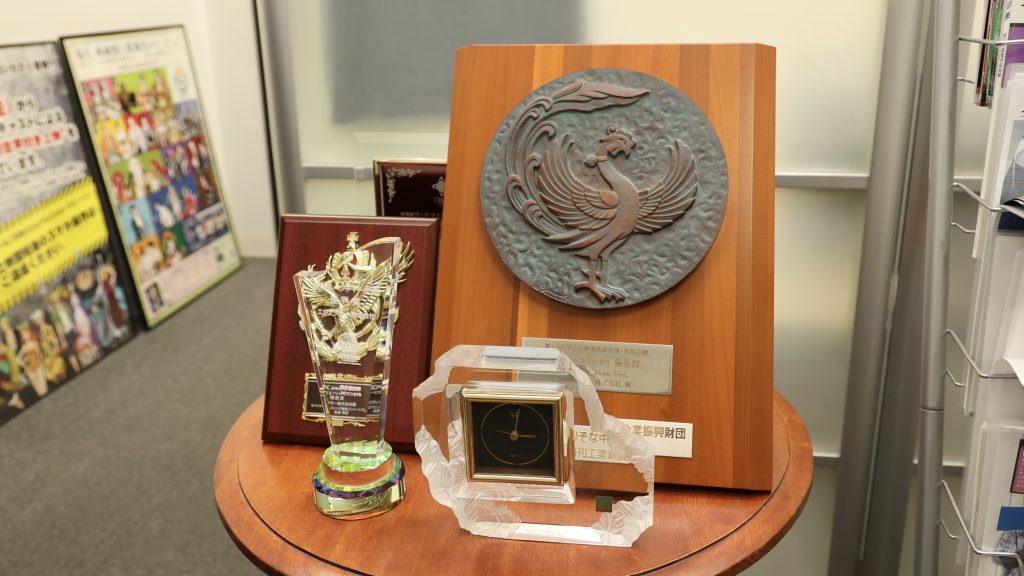 Photo of several creativeness and technology related awards that Evixar has won (taken by Spotlite)
Photo of several creativeness and technology related awards that Evixar has won (taken by Spotlite)
 Reason of building recognition wasn’t because of Audio guides
Reason of building recognition wasn’t because of Audio guides
― Were there any challenges you faced in the development process?
【Tokunaga】 We discussed how to make it easy to use because we’ve never created an application for handicapped people. We had various opinions such as “Wouldn't it be better to have a visually impaired person actually use it and ask them what they think?” and “On the other hand, if we ask for too many opinions, the usability would be too close to certain people because each person's disability situation is different”. As a result, we all agreed that we should first create something that we could use easily. We all proceeded with the development by trying it out.
【Tokunaga】 At first, we didn’t even know how to use the read-out function on smartphones that visually impaired people often use. We’ve heard that there are many visually impaired people who change read-out speed faster, so we attempted to listen to faster versions. Even now, Mr.Sakamoto continues to check each movie title by using a read-out function to see if it is easy to listen to.
【Sakamoto】 Recently, I’ve gotten used to the read-out function. It was difficult to use it at first, but now I can operate my phone with voice. I personally am conscious of thinking from the perspective of people involved, but I also value an objective viewpoint to make it easy for everyone to use.
【Nasu】 Considering the demonstration tests too, it took about seven years from the start of development to the release of the product. Before I decided to make an application, I was providing the technology to the other company’s application. In the middle of all that, I decided to create a whole thing from a development application in order to provide a service by protecting the security of films safely, I think that’s how I started. Recently, more and more people are using the application regardless of whether they have a disability or not, so we are conscious of making the application more user-friendly for more people.
【Tokunaga】 We discussed how to make it easy to use because we’ve never created an application for handicapped people. We had various opinions such as “Wouldn't it be better to have a visually impaired person actually use it and ask them what they think?” and “On the other hand, if we ask for too many opinions, the usability would be too close to certain people because each person's disability situation is different”. As a result, we all agreed that we should first create something that we could use easily. We all proceeded with the development by trying it out.
【Tokunaga】 At first, we didn’t even know how to use the read-out function on smartphones that visually impaired people often use. We’ve heard that there are many visually impaired people who change read-out speed faster, so we attempted to listen to faster versions. Even now, Mr.Sakamoto continues to check each movie title by using a read-out function to see if it is easy to listen to.
【Sakamoto】 Recently, I’ve gotten used to the read-out function. It was difficult to use it at first, but now I can operate my phone with voice. I personally am conscious of thinking from the perspective of people involved, but I also value an objective viewpoint to make it easy for everyone to use.
【Nasu】 Considering the demonstration tests too, it took about seven years from the start of development to the release of the product. Before I decided to make an application, I was providing the technology to the other company’s application. In the middle of all that, I decided to create a whole thing from a development application in order to provide a service by protecting the security of films safely, I think that’s how I started. Recently, more and more people are using the application regardless of whether they have a disability or not, so we are conscious of making the application more user-friendly for more people.
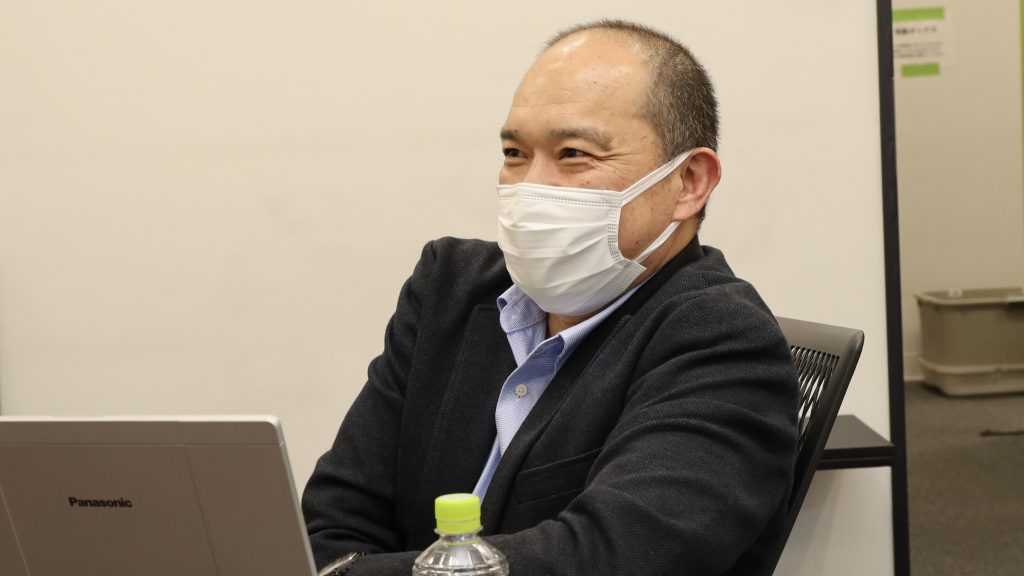 Photo of Mr.Nasu, member of sales department (taken by Spotlite)
Photo of Mr.Nasu, member of sales department (taken by Spotlite)
― Are there changes or discoveries in society that you guys are noticing?
【Nasu】 Since more and more films these days have disability themes and characters with disabilities, we have heard from people with various disabilities that they would like to actually watch these films in movie theaters. Therefore, requests for barrier-free are sometimes sent directly to the distributors for films screened without audio description or subtitles, and I feel that barrier-free accessibility is becoming a higher priority in the industry.
【Tokunaga】 On the other hand, we’ve seen several articles or social media posts that were critical of people using phones in movie theaters. Many of them were about people who were playing a game on their phones, or people who were texting back others. However, if such voices are raised, it will affect the use of voice guidance by the visually impaired people through their smartphones, and it will lead to hesitation of utilizing it. In consideration of such surroundings, we have devised a way to darken the screen after starting up the application so that the others cannot see that the phone is glowing.
【Nasu】 Since more and more films these days have disability themes and characters with disabilities, we have heard from people with various disabilities that they would like to actually watch these films in movie theaters. Therefore, requests for barrier-free are sometimes sent directly to the distributors for films screened without audio description or subtitles, and I feel that barrier-free accessibility is becoming a higher priority in the industry.
【Tokunaga】 On the other hand, we’ve seen several articles or social media posts that were critical of people using phones in movie theaters. Many of them were about people who were playing a game on their phones, or people who were texting back others. However, if such voices are raised, it will affect the use of voice guidance by the visually impaired people through their smartphones, and it will lead to hesitation of utilizing it. In consideration of such surroundings, we have devised a way to darken the screen after starting up the application so that the others cannot see that the phone is glowing.
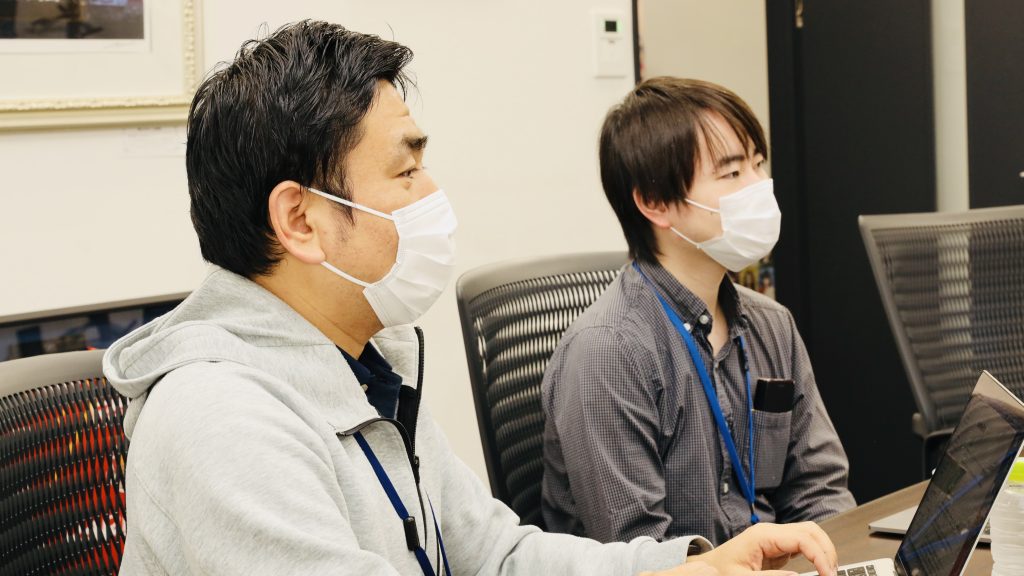 Photo of Mr.Tokunaga, and Mr.Sakamoto, research and development department(taken by Spotlite)
Photo of Mr.Tokunaga, and Mr.Sakamoto, research and development department(taken by Spotlite)
― I see, So consideration and mutual understanding with those who do not use apps is also important right?
【Sakamoto】 Just the other day, There was a discussion spreading on Twitter about what it's like to touch your phone in a movie theater. One person replied to that comment by saying, "There is an app called HELLO! MOVIE. This kind of communication makes me feel that the number of users who support us is growing.
【Nasu】 as a chance to clarify this misunderstanding, Audio Commentary played a huge role on that. Audio commentary is a service that differs from an audio description in that the actors and director talk about behind-the-scenes stories in a secondary voice-over format, “HELLO! MOVIE” supports it in a number of films.
In the case of audio commentary, because the number of users of the audio commentary is incredibly large, which coincided with the film industry's need to promote it as a new way of watching the film, and we were able to notify everyone about it before it was shown on the screen. I believe that this has allowed us to expand the awareness of "HELLO!MOVIE"
【Sakamoto】 Just the other day, There was a discussion spreading on Twitter about what it's like to touch your phone in a movie theater. One person replied to that comment by saying, "There is an app called HELLO! MOVIE. This kind of communication makes me feel that the number of users who support us is growing.
【Nasu】 as a chance to clarify this misunderstanding, Audio Commentary played a huge role on that. Audio commentary is a service that differs from an audio description in that the actors and director talk about behind-the-scenes stories in a secondary voice-over format, “HELLO! MOVIE” supports it in a number of films.
In the case of audio commentary, because the number of users of the audio commentary is incredibly large, which coincided with the film industry's need to promote it as a new way of watching the film, and we were able to notify everyone about it before it was shown on the screen. I believe that this has allowed us to expand the awareness of "HELLO!MOVIE"
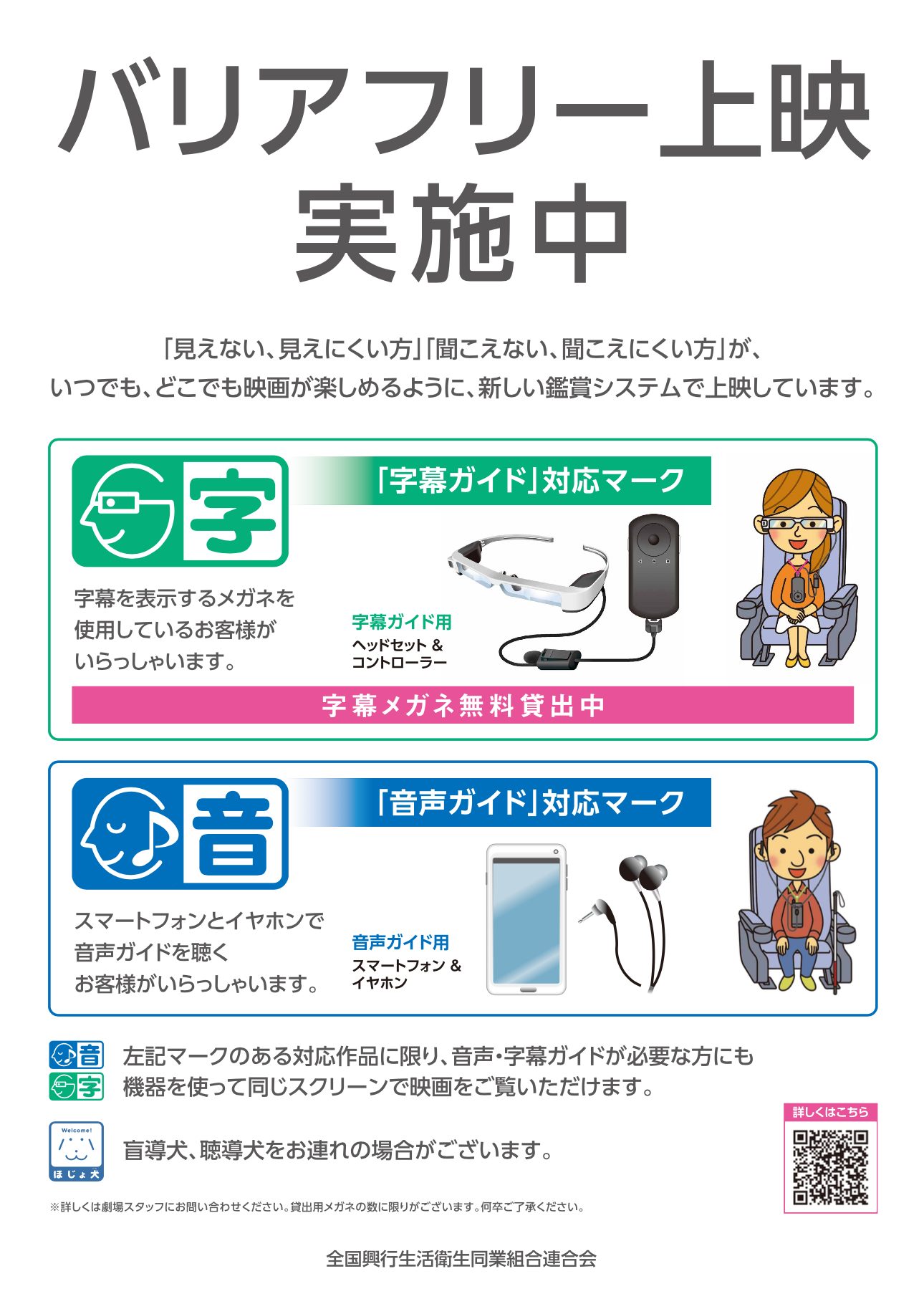 Image of announcement poster of Barrier Free Screening (by Evixar corporation)
Image of announcement poster of Barrier Free Screening (by Evixar corporation)
 Common experiences become life experiences the more you do them.
Common experiences become life experiences the more you do them.
― In what process, do you blow the audio description into movies?
【Tokunaga】 Audio description of “HELLO! MOVIE” is made by professional describers(people who write copy drafts of audio guides). It’s made cautiously by rewriting drafts many times while being checked by a visually impaired person. films are supervised by a director or other person during the production process, so explanations of the behind-the-scenes aspects of the film are also reflected.
【Nasu】 For this reason, we have heard comments from people who are not visually impaired that they enjoy the audio description for the "HELLO! MOVIE". It seems that when they listen to the audio description and watch the movie, they discover something different as they can understand the names of places and lands and grasp the situation.
【Tokunaga】 From now on, I would like to increase the number of films so that more describers can be active in the future. In terms of career choices, I feel that a new market is being created through audio guides. First of all, I would like to raise the awareness of the application and increase its value as a place where many people can be active.
【Tokunaga】 Audio description of “HELLO! MOVIE” is made by professional describers(people who write copy drafts of audio guides). It’s made cautiously by rewriting drafts many times while being checked by a visually impaired person. films are supervised by a director or other person during the production process, so explanations of the behind-the-scenes aspects of the film are also reflected.
【Nasu】 For this reason, we have heard comments from people who are not visually impaired that they enjoy the audio description for the "HELLO! MOVIE". It seems that when they listen to the audio description and watch the movie, they discover something different as they can understand the names of places and lands and grasp the situation.
【Tokunaga】 From now on, I would like to increase the number of films so that more describers can be active in the future. In terms of career choices, I feel that a new market is being created through audio guides. First of all, I would like to raise the awareness of the application and increase its value as a place where many people can be active.
― How are opportunities to contact with handicapped people created?
【Tokunaga】 until now, we’ve rarely met visually impaired people in person. So that we’ve noticed and felt changes of feeling after learning how to engage with visually impaired people at Training for Companion Aid Workers that I joined last year. Specifically, I’ve realized that I was pleased to just find the elevator by walking in town with an eye mask on. felt a genuine sense of happiness of being able to walk in the town. I could feel the accomplishment of doing whatever I could do with my eyes open one by one by walking with my eyes closed.
【Tokunaga】 When I translated this experience into my own work, I came to see that this accumulation of successful experiences can be realized in "HELLO! MOVIE" as well. For example, in order to see a movie at a movie theater, you need to plan about the movie at home, think about who you are going to see, buy tickets at the movie theater, and so on. In realizing these things, everything leads to a successful experience. Through "HELLO! MOVIE," we hope to not only help people enjoy movies, but also enhance the value of the series of activities before and after the movie-going experience.
Recently, we have been focusing on screenings at schools for the blind using the "HELLO! MOVIE" program. It is an opportunity for visually impaired children to learn that they can also see movies in theaters, and may lead to the experience of independently inviting their own family and friends to go see the movie.
【Nasu】 I just want to reach out to people who have never been to the cinema and have never heard of “HELLO! MOVIE”, so that they can enjoy movies.
【Tokunaga】 until now, we’ve rarely met visually impaired people in person. So that we’ve noticed and felt changes of feeling after learning how to engage with visually impaired people at Training for Companion Aid Workers that I joined last year. Specifically, I’ve realized that I was pleased to just find the elevator by walking in town with an eye mask on. felt a genuine sense of happiness of being able to walk in the town. I could feel the accomplishment of doing whatever I could do with my eyes open one by one by walking with my eyes closed.
【Tokunaga】 When I translated this experience into my own work, I came to see that this accumulation of successful experiences can be realized in "HELLO! MOVIE" as well. For example, in order to see a movie at a movie theater, you need to plan about the movie at home, think about who you are going to see, buy tickets at the movie theater, and so on. In realizing these things, everything leads to a successful experience. Through "HELLO! MOVIE," we hope to not only help people enjoy movies, but also enhance the value of the series of activities before and after the movie-going experience.
Recently, we have been focusing on screenings at schools for the blind using the "HELLO! MOVIE" program. It is an opportunity for visually impaired children to learn that they can also see movies in theaters, and may lead to the experience of independently inviting their own family and friends to go see the movie.
【Nasu】 I just want to reach out to people who have never been to the cinema and have never heard of “HELLO! MOVIE”, so that they can enjoy movies.
 Photo of Mr.Sakamoto and visually impaired person walking together, (taken by Spotlite)
Photo of Mr.Sakamoto and visually impaired person walking together, (taken by Spotlite)
― Is there a service that you are currently working on other than audio guide?
【Tokunaga】 A representative example is its use at sports games. The color of the penlights held by spectators is changed to light up in time with the music played from the stadium. In this initiative, we provide an experience in which "everyone gets excited by creating the same phenomenon together. In this way, we believe that our technology has the potential to enhance the value of a shared experience.
By the way, in the last article, Mr.Miwa and Mr.Sakamoto who watched a movie together became closer and closer. Common experiences leave such a strong impression that they can still talk about them fondly even after a year has passed. It seems to me that the more you do it consistently, the more it becomes a life experience.
【Nasu】 Other initiatives we are considering include the display of subtitles on the app in conjunction with emergency broadcasts to inform the hearing impaired who cannot hear emergency broadcasts of disasters such as earthquakes or fires during movie viewing.
【Tokunaga】 A representative example is its use at sports games. The color of the penlights held by spectators is changed to light up in time with the music played from the stadium. In this initiative, we provide an experience in which "everyone gets excited by creating the same phenomenon together. In this way, we believe that our technology has the potential to enhance the value of a shared experience.
By the way, in the last article, Mr.Miwa and Mr.Sakamoto who watched a movie together became closer and closer. Common experiences leave such a strong impression that they can still talk about them fondly even after a year has passed. It seems to me that the more you do it consistently, the more it becomes a life experience.
【Nasu】 Other initiatives we are considering include the display of subtitles on the app in conjunction with emergency broadcasts to inform the hearing impaired who cannot hear emergency broadcasts of disasters such as earthquakes or fires during movie viewing.
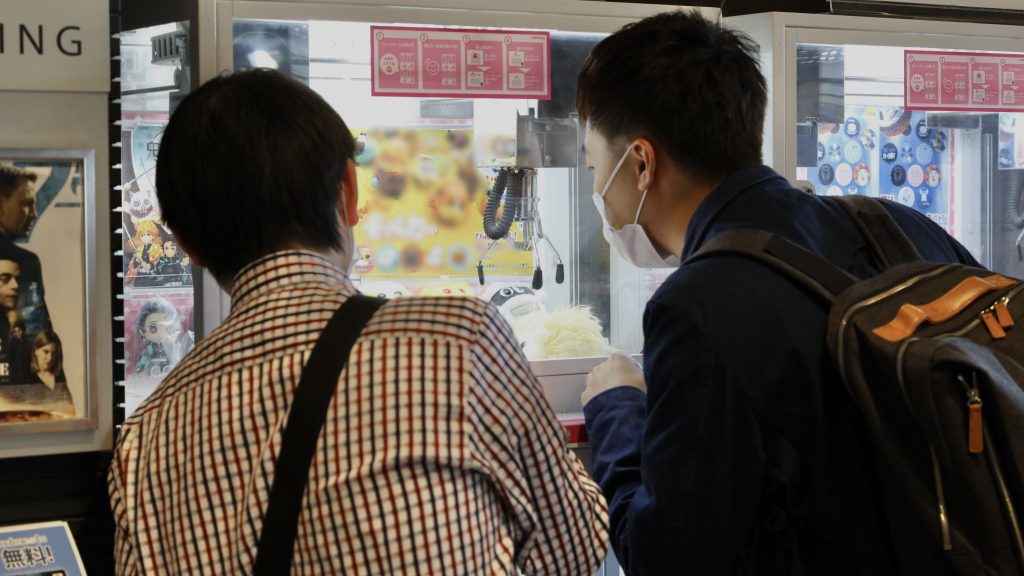 Photo of Sakamoto visually impaired person trying claw crane before watching the movie (taken by Spotlite)
Photo of Sakamoto visually impaired person trying claw crane before watching the movie (taken by Spotlite)
 Global expansion! Japanese audio description technology is advancing.
Global expansion! Japanese audio description technology is advancing.
― How are you planning to spread “HELLO! MOVIE”?
【Tokunaga】 I’ve been often told by Overseas film professionals that “Japan is advanced”, and we are discussing in the company what if we can use this system all over the world.
【Nasu】 The reason why we can’t provide audio guides with Western movies is due to overseas strict rights issues and we're trying to work on that. It seems that the whole industry has to work on it, and we would like to take this opportunity to expand overseas. As well, I think we need to do more distribution outside of the movie theatre and DVDs. But the difficult problem remains because different rights occur in between the distributing company and the package production company.
【Tokunaga】 Our president, Mr. Takigawa, has been talking a lot lately about the visually impaired being early adopters (a term from innovator theory; opinion leaders who use new services and products at an early stage) in the "HELLO! MOVIE" world. We see them as the ones who will break down the rights and stereotypes surrounding the film industry and open up the world.
【Tokunaga】 I’ve been often told by Overseas film professionals that “Japan is advanced”, and we are discussing in the company what if we can use this system all over the world.
【Nasu】 The reason why we can’t provide audio guides with Western movies is due to overseas strict rights issues and we're trying to work on that. It seems that the whole industry has to work on it, and we would like to take this opportunity to expand overseas. As well, I think we need to do more distribution outside of the movie theatre and DVDs. But the difficult problem remains because different rights occur in between the distributing company and the package production company.
【Tokunaga】 Our president, Mr. Takigawa, has been talking a lot lately about the visually impaired being early adopters (a term from innovator theory; opinion leaders who use new services and products at an early stage) in the "HELLO! MOVIE" world. We see them as the ones who will break down the rights and stereotypes surrounding the film industry and open up the world.
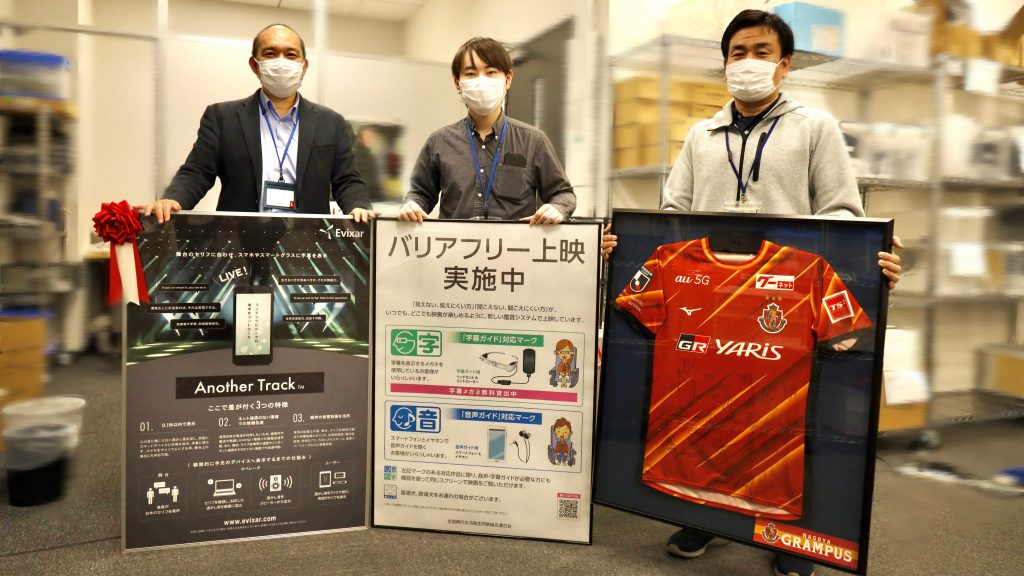 Photo of three of them holding their sponsor they collaborate with (taken by spotlite)
Photo of three of them holding their sponsor they collaborate with (taken by spotlite)
― Finally, if you were to describe Evixar in one sentence, what would it be?
【Tokunaga】 I imagine “we are playing in the mud” (lol). We are working hard with the faith of utilizing our technology in the society, like we don’t care if we are getting dirty.
【Sakamoto】 “Place that I don’t want to be apart from”, I can give various jobs a go, and this place can make use of my strengths.
【Nasu】 I am the oldest of these people, and thinking about it again after about 10 years, I feel that my friends have grown up. I have to go and sell the things I made playing in the mud lol.
― Thanks all of you for precious time
【Tokunaga】 I imagine “we are playing in the mud” (lol). We are working hard with the faith of utilizing our technology in the society, like we don’t care if we are getting dirty.
【Sakamoto】 “Place that I don’t want to be apart from”, I can give various jobs a go, and this place can make use of my strengths.
【Nasu】 I am the oldest of these people, and thinking about it again after about 10 years, I feel that my friends have grown up. I have to go and sell the things I made playing in the mud lol.
― Thanks all of you for precious time
The Interview for Mr.Tokunaga, Mr.Sakamoto, and Mr. Nasu ended here.

Messages from executive director CEO Mr.Takigawa
Since Executive director Mr. Takigawa was away for an interview, we asked him in an email about his thoughts at the time of establishing the company, and his future vision.
Along with the transition of his business, messages from Mr.Takigawa convey his enthusiasm to change society with his unique technology. I would like you to take a moment and read it.
― I’ve heard you were doing some IT things when you first established Evixar as opposed to now, what kind of business were you expanding?
Back in 2003, when I just established this company, continuous internet connection service was started. That was the time more and more average households connected to the internet since recruiting applications for ADSL of Yahoo ! BB was placed in front of stations. Behind that trend, we uniquely developed our own SaaS service to remotely control PCs at home or at work from outside the office over the Internet, and sold it to industries that require frequent business trips and to PC help desks.
― What was the turning point to expand current acoustic communication technology?
Because the Remote control business that I stated earlier, had been developing software based on Microsoft's Windows operating system, it was forced to change its specifications and restrictions every time the operating system was upgraded, and its customers were limited to PC users. From this problem awareness, I began to think that I wanted to work on a business that fulfills universal needs on a more physical layer. In the meantime, I began to think that the appearance of iPod and iPhone, the start of terrestrial digital broadcasting, and the emergence of YouTube will require a service for “video search” and “music search”. I began to think that it is going to be interesting to have the business of not only typing letters into the search box, but also using the phone as a microphone as an interphase.
For 2-3 years, we explored the image, video, and sound businesses, but we saw the sound field as the most blue ocean and decided to dig thoroughly into this area. This was around 2013.
― What value does "HELLO! MOVIE" have in the society your company aims to create?
I believe that a management style that allows the development of specialized technologies, known as "Deep Tech," to precede the development of new technologies is necessary to promote fundamental value creation and break through the limitations of capitalism, which is reaching a dead end based solely on economic rationality. However, turning specialized technology into money and establishing it in society isn’t simple.That’s because people typically take for granted an environment in which they were born and raised, and tend to miss circumstances that they’ve never experienced.
― Could you tell me your society model that you try to create?
The society we are trying to create is “ early adopter is handicapped people " who told us the unique value of Evixar’s acoustic communication technology. And the technology has started getting applied in different fields. Even if the whole town is connected to the internet due to the evolution of wireless technology named Beyond 5G, challenges of “how to not leave humans behind” coexist. So Evixar’s “sound signal processing” technology has a chance to continue promoting its value for solving challenges like that.
I sense that obtainable realization while facing fundamental challenges of human and society can change with the passage of time even if it is a “rusted field", and become a massive force no matter how small the result is by growing sympathy. As a Deep Tech company in the acoustic field, I believe that our approach to commercialization, which suggests "fully preparedness to solve social issues by utilizing coincidence," will become even more important in the future.
Evixar’s acoustic technology has been contributing in “expansion and support of audio visual” spread based on smartphones, barrier screening of movies and performing arts, and etc. we are going to improve our own technology including peace and safe value provision to make true “Sound interphase that makes people way happier” in order to fully utilize the appearance of evolved devices like IoT devices and wearable devices.
Along with the transition of his business, messages from Mr.Takigawa convey his enthusiasm to change society with his unique technology. I would like you to take a moment and read it.
― I’ve heard you were doing some IT things when you first established Evixar as opposed to now, what kind of business were you expanding?
Back in 2003, when I just established this company, continuous internet connection service was started. That was the time more and more average households connected to the internet since recruiting applications for ADSL of Yahoo ! BB was placed in front of stations. Behind that trend, we uniquely developed our own SaaS service to remotely control PCs at home or at work from outside the office over the Internet, and sold it to industries that require frequent business trips and to PC help desks.
― What was the turning point to expand current acoustic communication technology?
Because the Remote control business that I stated earlier, had been developing software based on Microsoft's Windows operating system, it was forced to change its specifications and restrictions every time the operating system was upgraded, and its customers were limited to PC users. From this problem awareness, I began to think that I wanted to work on a business that fulfills universal needs on a more physical layer. In the meantime, I began to think that the appearance of iPod and iPhone, the start of terrestrial digital broadcasting, and the emergence of YouTube will require a service for “video search” and “music search”. I began to think that it is going to be interesting to have the business of not only typing letters into the search box, but also using the phone as a microphone as an interphase.
For 2-3 years, we explored the image, video, and sound businesses, but we saw the sound field as the most blue ocean and decided to dig thoroughly into this area. This was around 2013.
― What value does "HELLO! MOVIE" have in the society your company aims to create?
I believe that a management style that allows the development of specialized technologies, known as "Deep Tech," to precede the development of new technologies is necessary to promote fundamental value creation and break through the limitations of capitalism, which is reaching a dead end based solely on economic rationality. However, turning specialized technology into money and establishing it in society isn’t simple.That’s because people typically take for granted an environment in which they were born and raised, and tend to miss circumstances that they’ve never experienced.
― Could you tell me your society model that you try to create?
The society we are trying to create is “ early adopter is handicapped people " who told us the unique value of Evixar’s acoustic communication technology. And the technology has started getting applied in different fields. Even if the whole town is connected to the internet due to the evolution of wireless technology named Beyond 5G, challenges of “how to not leave humans behind” coexist. So Evixar’s “sound signal processing” technology has a chance to continue promoting its value for solving challenges like that.
I sense that obtainable realization while facing fundamental challenges of human and society can change with the passage of time even if it is a “rusted field", and become a massive force no matter how small the result is by growing sympathy. As a Deep Tech company in the acoustic field, I believe that our approach to commercialization, which suggests "fully preparedness to solve social issues by utilizing coincidence," will become even more important in the future.
Evixar’s acoustic technology has been contributing in “expansion and support of audio visual” spread based on smartphones, barrier screening of movies and performing arts, and etc. we are going to improve our own technology including peace and safe value provision to make true “Sound interphase that makes people way happier” in order to fully utilize the appearance of evolved devices like IoT devices and wearable devices.

Lastly
During the interview with those three, It was impressive that they “read through messages they received in the company and voices from social media”.
They’ve been working on making improvements based on customers' voices even after they released the application.
I thought this behaviour of seriously facing technology is the crucial aspect of creating new value in the society.
I hope lots more customers will enjoy the new way of watching movies by using “HELLO! MOVIE”. Thanks for taking time and reading this until the end.
I hope lots more customers will enjoy the new way of watching movies by using “HELLO! MOVIE”. Thanks for taking time and reading this until the end.


